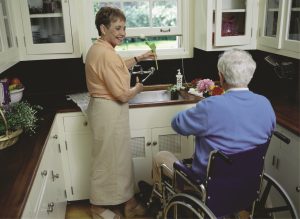Communicating Efficiently with Your Loved One
 For any family caregiver, effective communication with your loved one is important to have. Good communication skills can help to build trust, prevent misunderstandings, and improve overall well-being.
For any family caregiver, effective communication with your loved one is important to have. Good communication skills can help to build trust, prevent misunderstandings, and improve overall well-being.
Keep several of these basic communication principles in mind when caring for your loved one:
- Listen actively: Listening actively is an important skill that can help you better understand your loved one’s needs and concerns. When you listen actively, you pay attention to what the person is saying by using body language to show interest and asking clarifying questions.
- Speak clearly and calmly: When speaking to your loved one, it is important to speak clearly and calmly. Avoid speaking too fast or too loudly, as it can be confusing or upsetting.
- Use non-verbal communication: Non-verbal communication includes body language, facial expressions, and tone of voice. Using appropriate non-verbal communication can help you convey your feelings, show empathy, and help your loved one understand your intentions.
- Use open-ended questions: Open-ended questions encourage conversation and can help you deepen your understanding of your loved one’s needs. Avoid asking questions that can be answered with a simple “yes” or “no.”
- Be patient: Caregiving can be challenging, and your loved one may become frustrated or confused. Be patient and try to understand their perspective.
Effective communication can be an essential part of caregiving. By practicing these communication skills, you can build strong relationships with your loved one, healthcare providers, and other caregivers to work together to provide the best possible care.
To learn more about effective communication tools and resources, speak with a Community Resource Specialist: (408) 350-3200, option 1.
